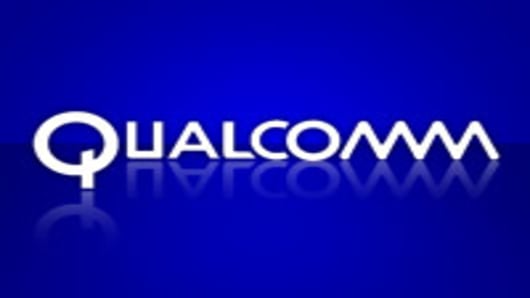Qualcomm and Nokia have settled a three-year, three-continent legal battle when Nokia agreed to make an upfront payment and ongoing royalties to the U.S. technology company.
Investors, relieved that the fight was finally over, drove Qualcomm's shares 15 percent higher to $51.75 in after-hours trade after it unveiled a 15-year pact with Nokia, the No. 1 cell phone maker. The deal covers the world's most widely used mobile-phone technologies and some key emerging ones.
The companies did not reveal specific financial details but some analysts saw Nokia as the winner.
"The positive financial impact of this agreement is within Nokia's original expectations," Nokia Chief Executive Olli-Pekka Kallasvuo said in a statement. Nokia spokeswoman Laurie Armstrong said that the royalty rates under the new agreement were lower than those under its previous agreement with Qualcomm.
Nokia had been pressuring Qualcomm for a cut in the rate it was paying Qualcomm in royalties under a pact that expired in April 2007. Analysts estimated that rate at 4 to 5 percent.
Stifel Nicolaus analyst Cody Acree said that a Nokia success could lead other Qualcomm clients to look for lower royalty rates or start new legal fights.
"Investors are giving Qualcomm immediate credit in after-hours trade but it's not cut and dried," Acree said. "It could put some pressure on the royalty models or in chipset volumes that Qualcomm hasn't had to deal with in the past."
Qualcomm chip customers include South Korea's Samsung Electronics and LG Electronics. Its rivals include Texas Instruments , Broadcom and Infineon Technologies.
Qualcomm officials did not return calls requesting comment beyond its statement.
Under the agreement, Nokia has a license to use all of Qualcomm's patents in its phones and network equipment. In return, Nokia agreed to allow Qualcomm to use its technology in its chips.
Nokia also agreed to assign ownership of a number of patents to Qualcomm, including patents essential to the widely used wireless technology standards WCDMA, GSM and OFDMA.
As part of the agreement, Nokia also said it would withdraw an anti-competitiveness complaint it made along with several other companies against Qualcomm to the European Commission.
Qualcomm said the agreement paved the way for "enhanced opportunities between the companies in a number of areas" but did not give further details.
Qualcomm outside counsel Steven Strauss, a partner at Cooley Godward Kronish, said the agreement was reached Wednesday afternoon. "We've been having discussions over the past couple of days," Strauss told Reuters.
After the settlement was announced, Qualcomm posted a quarterly profit in line with expectations and revenue slightly ahead of analyst targets. It said it would give financial forecasts during its conference call on Thursday.
Excluding items such as its investment arm, Qualcomm earned 55 cents a share for its third quarter ended June 29, on revenue of $2.8 billion. Analysts on average had expected earnings of 55 cents share on revenue of $2.71 billion, according to Reuters Estimates.
Qualcomm shares had closed at $44.82 on Nasdaq, up 1.6 percent in the regular session.


